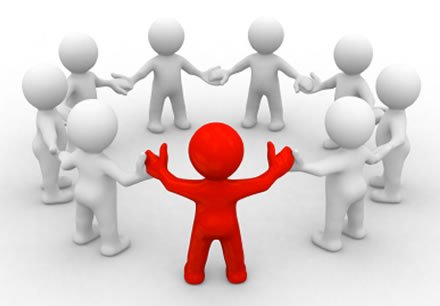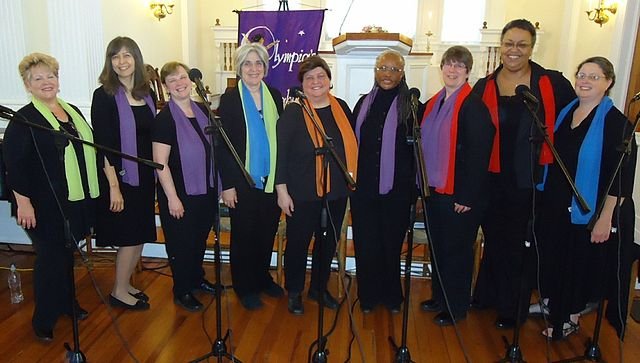Human contact has a powerful effect throughout our lives, especially when we are having problems, be they physical or psychological. I talked about the power of a gentle touch in a recent post, where soft, gentle strokes can make people feel less socially excluded or ostracized.

Source
Human contact isn't just about physical touch. Having human contact by being in the presence of others has an effect on our psychological state. And as can be shown, the psychological state can affect the physiological and physical state. That is, what affects the body can affect the mind, and what affects the mind can affect the body.
A study awaiting peer-review was talked about in the magazine Resurgence & Ecologist. It was about how community can help people with health issues. This was done in a town called Frome, in Somerset, England. It might be too early to conclude that community involvement makes people healthier, because the correlation might not indicate actual causation.
However, the data seems to show that emergency trips to the hospital fall greatly when isolated people with health problems get community and volunteer support in their lives. This 17% drop in Frome for the 3 year study happened while the rest of Somerset experienced a 29% increase in emergency admissions to hospitals.
Frome has become a sociable community with a sense of purpose, thanks in part to the efforts of the Compassionate Frome project that began in 2013. This project sought to build a more compassionate community.
The project recognized that healthcare patients felt their issues were being treated as a cluster of symptoms, instead of seeing a person who had a health problem. The medicalization of patients looks at one symptom and deals with it alone, often treating it with pills.
This is called "silo working" or "silo mentality", where each symptom is looked at isolated in a silo, and treated in a silo where one silo is ignorant of and not communicating with others. This is a form of compartmentalization that works against the health improvement of a patient.

Source
This leaves patients feeling stressed and dejected from a lack of proper solutions to their overall health.
Rather than thinking in silos, connecting things and looking at the body and health to see what is going on as a whole can bring about better solutions. Agencies and community groups were set up in Frome to fill the gaps as "health connectors" to help people plan their care. "Community connectors" were also trained to help people find the support they needed.
Community support can come in many forms. Some people need help to managing their debts or their houses. Other people don't have such issues, but benefit from joining exercise groups, writing workshops, clubs or singing choirs.

Source
Some new research has recently come out about the benefits of singing in groups for mental health patients and the general public. Social engagement is part of singing workshops which helps to generate feeling of connection, belonging and well-being.
Inclusion within a community activity helps to break people out of their isolation that acts as a cycle of misery: illness can reduce socialization, which in turn leads to isolation and loneliness, which can then make the illness worse. Stress and social isolation can increase inflammation. Inflammation can affect our behavior by making us withdraw from social contact. Inclusion and connection with others can reduce stress and isolation, thereby making people healthier.
Our immune system has evolved to listen to our social condition. In the past survival was more harsh, where social isolation increased the risk of predation and sickness. An inflammatory response could be a way to attempt to protect the body in anticipation of a wound or disease. From isolation, to inflammation, to more isolation and even depression.
Social relationships have been studied elsewhere, showing a lower change of death that is comparable to quitting smoking. HIV patients with strong social support have lower level of the virus than those without. Older patients with one or two chronic disease, and high levels of social support, do not have higher death rates that those without chronic diseases.
Social contact seems to be the best kind of prescription a doctor could make to help people with illnesses. If the general public knew about these studies and the effects of social contact, they could take charge of their lives more, and instead of only asking what the doctor is going to do for them, they already know that they are the ones that need to think of what they are going to be doing in their social lives to help themselves.
The power of community can heal.

Source
What do you think? Have your say!
- Will you try to increase your social contact if you get sick or ill as a way to help you heal?
- Have you ever felt ignored by the medical establishment that treats symptoms instead of your whole body health?
- Have you ever experienced the healing aspect of being part of a community, of belonging and feeling connected?
Thank you for your time and attention. Peace.
If you appreciate and value the content, please consider: Upvoting, Sharing or Reblogging below.
 me for more content to come!
me for more content to come!
My goal is to share knowledge, truth and moral understanding in order to help change the world for the better. If you appreciate and value what I do, please consider supporting me as a Steem Witness by voting for me at the bottom of the Witness page; or just click on the upvote button if I am in the top 50.

This is totally right!
Finding support in friends and family is a key aspect for people to be able to overcome health issues, especially if this issues are the types that can cause some embarrassment when discussing, such as the case with phobias.
Sometimes we might underestimate the real social interaction has when maintaining good health in our lives. We develop societies for one reason, and its because finding group to support us is very useful when surviving.
Besides, we all know laughing is also beneficial for our health, and unless we are crazy the only way to laugh and have a nice time is by hanging out with other people.
Cheers!
PS: I left you a message on discord with some short questions if you don't mind :D
Indeed, survival with cooperation in a group is highly beneficial. We can laugh by ourselves, by watching a movie, or other things, we don't need to be crazy ;) Thanks for the feedback.
I don't have access to my old discord account for now, I made a post about it too hehe: https://steemit.com/discord/@krnel/discord-tip-save-your-discord-backup-codes-for-2fa-or-you-might-get-locked-out-of-your-account-like-me
Oh I didn't knew that.
Do you have a new discord account? or a steem.chat account?
First of all. I've missed you Krnel. Big ups to your Witness.
.
A timely comment from you. I appreciate your reflection on community not just from a rewarding standpoint but from a health point of view.
.
I do #improv. And improv has a large communal aspect to the experience for both Players and Audience. One goes to meet with other people to listen and laugh together. There is something empowering about a room full of laughter. You articulate the benefits better than I can. But I can tell you that most improvisers I know seem to stop aging once they begin their improv careers.
.
It is one of the reasons I continue to Invite Fellow Improvisers to STEEM. I'm looking forward to reading your posts again Krnel. Wishing you the best. And you are always welcome to stop by our humble supportive community, steemexperience.com.
That's good for people to be benefiting from improv. I'm not much into that ;) Any communal social interaction is beneficial, so there are plenty of things people can find that get them to connect and benefit from :) Thanks for the appreciation and welcoming back. Take care. Peace.
"The medicalization of patients looks at one symptom and deals with it alone, often treating it with pills".
In my opinion this is only occured among medical practice.. however among nurse...we work based on patient's need called "patient-centered". It includes listening to, informing and involving patients in their care. Providing care that is respectful of, and responsive to, individual patient preferences, needs and values, and ensuring that patient values guide all clinical decisions.
Glad to know. Way to go, good job!
That's really important to keep in mind. We function best when we are part of a community. I wonder if online communities offer at least some of the benefits of real-life ones?
Some of the interaction at a psychological level of well-being... but psychical interaction adds more in addition, and probably a higher quality quality of psychological affect as well.
Medical professionals make more money off of you by treating the symptoms rather than the cause. If treating the cause made them a one time shot of $400.00 and treating the symptoms of a period of 10 years made them a whopping $750,000.00 what would the average person do? Yes money sadly trumps integrity. Community is good provided the community is good and truly has a genuine interest in your well being. The example I provided above was from the video "Dead Doctors Don't Lie." By Joe Wallach. Thanks @krnel. PS Visiting the Doctors waiting room runs your the risk of catching many illnesses. I am not against visiting the doctor, but one must use good judgement. I go for a yearly.
True that, money motivates a lot. Why cure things cheaply when you can prolong "treatment" for a long time and suck more cash :/
a month or two back I realized how socially isolated I have designed my life to be and that has been an important influence on why i joined steemit. I have found that to be a step in right direction. Excellent commentary on how medical profession view disease and it's symptoms as a rough edges on a table in need to be filed down.
Glad Steemit is providing you with some help in social isolation :)
Steemit has surely been significant but one should not be naive enough to take it as a substitution.
The real presence of people in our life is much more than what they say (or write). There is something vital in social interaction which cannot be attained through social media.
Congratulations! Your post has been selected as a daily Steemit truffle! It is listed on rank 15 of all contributions awarded today. You can find the TOP DAILY TRUFFLE PICKS HERE.
I upvoted your contribution because to my mind your post is at least 30 SBD worth and should receive 73 votes. It's now up to the lovely Steemit community to make this come true.
I am
TrufflePig, an Artificial Intelligence Bot that helps minnows and content curators using Machine Learning. If you are curious how I select content, you can find an explanation here!Have a nice day and sincerely yours,

TrufflePigGreat article and glad I finally found time to read it. I'd noticed it yesterday and wanted to.
I love your emphasis on physical health that is an outgrowth of community support, and would like to add an emphasis on the psychological challenges and rewards for people how particularly struggle with this.
As someone with a social anxiety disorder, it has been very hard for me all my life to be able to socialize. It is exhausting. Yet I still need community interaction just like anyone else.
Children who grow up with social anxiety tend to avoid play time with other children, preferring to read books or engage in solitary play. I suppose these days they have all sorts of gadgets as well. It is all so much easier to engage with than real people.
And the longer this goes on, the more the social skills of those children fall behind those of their peers. So the pain of rejection when one does try to interact just gets worse and worse over time.
Many in this situation wind up becoming anti-social, actually hating other people. It's because they hate the painful experiences they always have, because they don't know how to fit into a community, because learning it was too painful and they didn't get enough support growing up to get them to learn it anyway.
Those who don't become anti-social, typically become depressed and even suicidal. Imagine moving through the world being really terrible at getting the one thing you need most. Every cry for love being met with rejection, because you don't know how to do it the right way.
So articles like these are important, in case maybe they lead people to replace rejection with compassion sometimes. If we can all stop a moment and think, "well maybe this person is just really bad at connecting, but still could use some kindness from me," then I think we'll start seeing many opportunities to do these simple little things like saying a warm hello to a person walking past with their head down. Or offering a flower to a stranger standing in line with a blank look on his or her face. Or just noticing that they are there, and that as a human they need to be loved.